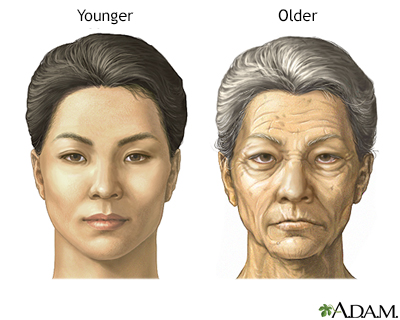Changes in face with age
Changes in face with age

With aging, the outer skin layer (epidermis) thins even though the number of cell layers remains unchanged. The number of pigment-containing cells (melanocytes) decreases, but the remaining melanocytes increase in size. Aging skin thus appears thinner, more translucent. Age spots or liver spots may appear in sun-exposed areas. Changes in the connective tissue reduce the skin's strength and elasticity. This is known as elastosis and is especially pronounced in sun-exposed areas.

Review Date:11/30/2022
Reviewed By:Ramin Fathi, MD, FAAD, Director, Phoenix Surgical Dermatology Group, Phoenix, AZ. Also reviewed by David C. Dugdale, MD, Medical Director, Brenda Conaway, Editorial Director, and the A.D.A.M. Editorial team.
The information provided herein should not be used during any medical emergency or for the diagnosis or treatment of any medical condition. A licensed medical professional should be consulted for diagnosis and treatment of any and all medical conditions. Call 911 for all medical emergencies. Links to other sites are provided for information only -- they do not constitute endorsements of those other sites. © 1997-A.D.A.M., Inc. Any duplication or distribution of the information contained herein is strictly prohibited.
The Agency for Health Care Administration (Agency) and this website do not claim the information on, or referred to by, this site is error free. This site may include links to websites of other government agencies or private groups. Our Agency and this website do not control such sites and are not responsible for their content. Reference to or links to any other group, product, service, or information does not mean our Agency or this website approves of that group, product, service, or information.
Additionally, while health information provided through this website may be a valuable resource for the public, it is not designed to offer medical advice. Talk with your doctor about medical care questions you may have.